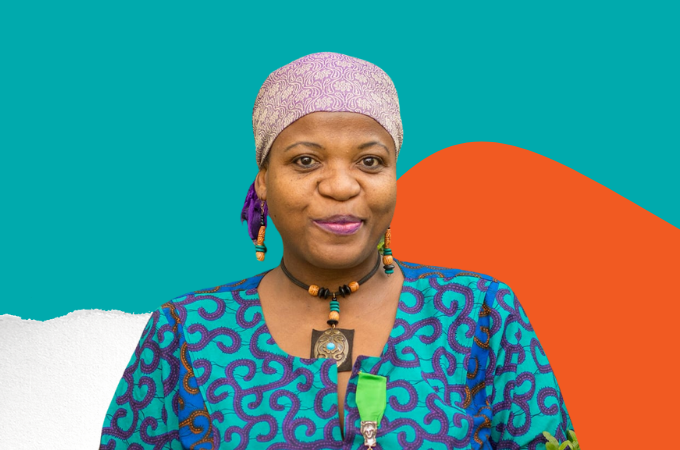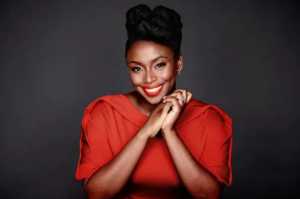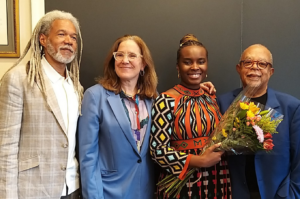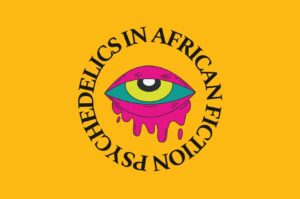
Brittle Paper African Literary Person of the Year, now in its 6th year, recognizes an individual who has done outstanding work in advancing African literary culture and industry in the given year. The 2020 honor goes to South African novelist Zukiswa Wanner, who, in what many would agree has been a challenging year, stepped up to the moment in outstanding ways. Wanner is an accomplished writer, having published 4 novels, a memoir and various collaborative book projects. Yet, over the years, she has made considerable contributions to the advancement of literary institutions that benefit African writers and expand the continent’s reading culture.
Her dedication to African literary culture comes from deep understanding of Africa’s diversity and its shared experiences. She was born in Lusaka, Zambia to a South African father and a Zimbabwean mother. She has travelled the continent, has at several times been named a honorary Nigerian, currently lives in Nairobi, and still works out of Johannesburg. This pan-African way of being in the world grounds her commitment to the culture.
One of the landmark moments of Wanner’s involvement in literary culture goes back to 2006 when she published her first book, titled The Madams. A brilliant work of fiction, it introduced readers to her uniquely captivating writing style and offered a powerful, new portrait of the African woman in fiction. The timing of the book’s publication is significant. It includes Wanner in a special group of writers who, in the 2000s, began telling stories differently to capture new audiences both on the continent and diaspora. Coming out of the economic hardship of the 1980s and 1990s when African publishing dwindled, these writers renegotiated the terms of their visibility in the global literary landscape, demanding that publishers seem them for who they are and for the complex truths they offered about the continent. Zukiswa was part of this movement of young literary pioneers, which included the likes of Wainaina Binyavanga, Yvonnne Adhiambo Owuor, Taiye Selasi, Chris Abani, Helon Habila, Brian Chikwava, Chimamanda Adichie, and many others. In a sense, then, when we tell the story of the rebirth of African literary culture at the turn of the new millennium, one name we cannot help but mention is Zukiswa Wanner.
The fact that she has been there from the beginning might explain why she has a keen sense of what the African literary industry needs and why she has, over the decades, extended her influence beyond the sphere of creative writing into more institutional areas of culture. Wanner is what you call a Writer’s writer, a distinction reserved for a writer who, in addition to establishing a successful career as an author, makes space for other writers to rise and thrive. Many authors are content with simply writing, publishing books, and receiving accolades from their peers. There is nothing wrong with that. But a handful like Wanner do not stop there. At much cost to themselves, they elevate other writers by investing in the infrastructures of the literary industry.
Wanner has made a series of institutional interventions that has helped many African writers. She has conducted numerous workshops for writers on the continent. With ReadSA, she helped bolster South Africa’s reading culture. She served as board member of Writivism, a platform that launched many African writers into a successful career. Her service on the judging panel of the Etisalat Prize for Literature in 2015 and, two years later, the Commonwealth Short Story Prize (Africa region) placed her in the position of finding new audiences for early career writers. In 2017, she co-founded La Shamba, a multi-lingual platform for African and Latin American writers to engage in cross-cultural conversations. She then launched the AfroYoungAdult training and mentoring initiative for young writers. The program involved workshops coordinated across various African cities—Accra, Dakar, Dar es Salaam, Kigali, Johannesburg, Lagos, Lome—and led to an anthology of short stories, which was published earlier this year. With platforms such as the Goethe-sponsored Artistic Encounters and, more recently, Virtually Yours, Wanner continues to provide visibility for writers and artists. For her long-time collaboration with the Goethe Institut, she was awarded 2020 Goethe Medal, an honor reserved for individuals “who have made an outstanding contribution to international cultural exchange.” We hope that winning the award opens more doors for her to keep working at the forefront of literary culture.
Wanner is also that person in the community who, when there is a common concern, gets everyone together to find a solution. When the COVID pandemic hit earlier this year, the effect on literary culture was disruptive—festivals, book launches, workshops were canceled. The lockdown mandate in many parts of the world during the early months of the virus’s spread almost grounded literary activities to a halt. But Wanner saw the lockdown as an opportunity to gather the literary community in a new way. She launched the Afrolit Sans Frontieres Literary Festival. On March 23, 16 writers assembled in a virtual festival and shared their work with readers in a live broadcast on Facebook and Instagram. Three more editions of the festival followed, the most recent of which made history as the first ever literary festival to be held entirely in African languages. The literary festival has been a gift. The reception was enthusiastic. Writers could engage with audiences, and readers could find community in spite of isolation.
Other members of the African literary community see Wanner’s contributions in a similar light. As Yewande Omotoso, author of Author of Woman Next Door, tells us in an email message:
I have always felt lucky to call Zukiswa my friend, constantly needing to work twice as hard to keep up with her energy and match her natural ebullience and generosity of spirit; ever grateful for her tolerance of my much more introverted reclusive nature. It is that same generosity and ebullience that Zuki has applied to orchestrating a vibrant cultural commons on the continent. Whether through her own considerable written contributions or through her many exertions as an advocate for African literature, almost anything interesting happening that involves books by African writers, conversations, debate and celebration, Zukiswa has a hand in.
Blogger and Journalist James Murua of Jamesmurua.com echos Omotoso’s praise for Wanner as both a writer and a culture show-runner.
In the last few years, [Wanner’s] contributions to the Pan African literary community have been more than just her award-winning writing. Many of her activities have built literary communities while raising up writers, and other artists, new and not so new….She juggled the many activities while showing generosity, compassion, and humor rare in the African literary community embodying the best of all of us.
For Thando Mgqolozana, author of A Man Who Is Not a Man and founder/curator of Abantu Festival, his encounter with Wanner opened up doors for him early on in his writing career:
My memory of entering the literary community after the publication of my debut novel more than a decade ago, involves the warm welcome extended to me by one Zukiswa Wanner. She did not finish an interview without mentioning my work; she told everybody who could listen, and even those who wouldn’t, what an amazing writer I was. We became friends, the loudmouths at literary festivals, we dreamed together and some of these dreams earned us interesting names. I’m ever so delighted to have written and lived in the time of Zukiswa Wanner. She did not do this for me alone, I’d soon find out, but for every writer she encountered in the continent.
When we count our blessings as a community and talk about how far we’ve come, how African literature is thriving, how we are building better institutions than those who came before us did, how we are leveraging technology to expand African literature’s global reach, let us also recognize that these strides would not be possible without people like Wanner, who tirelessly, selflessly cultivate spaces for cultural advancement. Wanner, thank you for all you do to elevate and inspire us.
Congratulations on being Brittle Paper’s 2020 Literary Person of the Year.
******
See Full List of the 2020 Brittle Paper Person of the Year









Lolonga Tali October 01, 2021 05:44
Would love to receive your newsletter online.